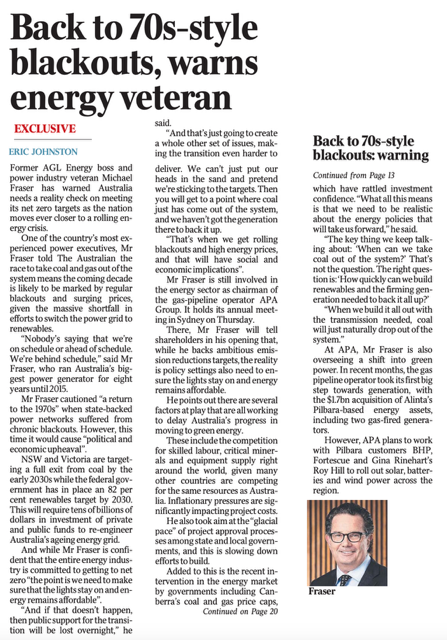Back to 70s-style blackouts, warns energy veteran
EXCLUSIVE Former AGL Energy boss and power industry veteran Michael Fraser has warned Australia needs a reality check on meeting its net zero targets as the nation moves ever closer to a rolling energy crisis. One of the country's most experienced power executives, Mr Fraser told The Australian the race to take coal and gas out of the system means the coming decade is likely to be marked by regular blackouts and surging prices, given the massive shortfall in efforts to switch the power grid to renewables. "Nobody's saying that we're on schedule or ahead of schedule. We're behind schedule," said Mr Fraser, who ran Australia's biggest power generator for eight years until 2015. Mr Fraser cautioned "a return to the 1970s" when state-backed power networks suffered from chronic blackouts.

Article by Eric Johnston courtesy of the Australian
EXCLUSIVE Former AGL Energy boss and power industry veteran Michael Fraser has warned Australia needs a reality check on meeting its net zero targets as the nation moves ever closer to a rolling energy crisis.
One of the country’s most experienced power executives, Mr Fraser told The Australian the race to take coal and gas out of the system means the coming decade is likely to be marked by regular blackouts and surging prices, given the massive shortfall in efforts to switch the power grid to renewables.
“Nobody’s saying that we’re on schedule or ahead of schedule. We’re behind schedule,” said Mr Fraser, who ran Australia’s biggest power generator for eight years until 2015. Mr Fraser cautioned “a return to the 1970s” when state-backed power networks suffered from chronic blackouts.
However, this time it would cause “political and economic upheaval”. NSW and Victoria are targeting a full exit from coal by the early 2030s while the federal government has in place an 82 per cent renewables target by 2030.
This will require tens of billions of dollars in investment of private and public funds to re-engineer Australia’s ageing energy grid. And while Mr Fraser is confident that the entire energy industry is committed to getting to net zero “the point is we need to make sure that the lights stay on and energy remains affordable”.
“And if that doesn’t happen, then public support for the transition will be lost overnight,” he said. “And that’s just going to create a whole other set of issues, making the transition even harder to deliver. We can’t just put our heads in the sand and pretend we’re sticking to the targets.
Then you will get to a point where coal just has come out of the system, and we haven’t got the generation there to back it up. “That’s when we get rolling blackouts and high energy prices, and that will have social and economic implications”.
Mr Fraser is still involved in the energy sector as chairman of the gas-pipeline operator APA Group. It holds its annual meeting in Sydney on Thursday. There, Mr Fraser will tell shareholders in his opening that, while he backs ambitious emission reductions targets, the reality is policy settings also need to ensure the lights stay on and energy remains affordable.
He points out there are several factors at play that are all working to delay Australia’s progress in moving to green energy. These include the competition for skilled labour, critical minerals and equipment supply right around the world, given many other countries are competing for the same resources as Australia.
Inflationary pressures are significantly impacting project costs. He also took aim at the “glacial pace” of project approval processes among state and local governments, and this is slowing down efforts to build.
Added to this is the recent intervention in the energy market by governments including Canberra’s coal and gas price caps, Continued on Page 20 which have rattled investment confidence. “What all this means is that we need to be realistic about the energy policies that will take us forward,” he said.
“The key thing we keep talking about: ‘When can we take coal out of the system?’ That’s not the question. The right question is: ‘How quickly can we build renewables and the firming generation needed to back it all up?’
“When we build it all out with the transmission needed, coal will just naturally drop out of the system.” At APA, Mr Fraser is also overseeing a shift into green power. In recent months, the gas pipeline operator took its first big step towards generation, with the $1.7bn acquisition of Alinta’s Pilbara-based energy assets, including two gas-fired generators. However, APA plans to work with Pilbara customers BHP, Fortescue and Gina Rinehart’s Roy Hill to roll out solar, batteries and wind power across the region.

